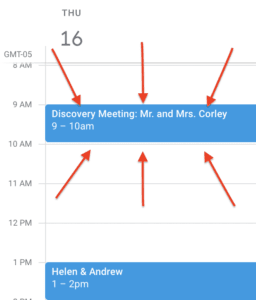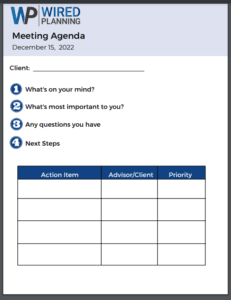“When your values are clear, your decisions are easy.” - Roy Disney
Imagine pulling up your calendar for tomorrow morning.
You have a meeting scheduled with a prospective client.

Not just any prospective client.
This is THE ideal client for your business.
The type of client who immediately goes to the top of your “A-List.”
The type of client you would clone 50 times if you could.
With that meeting in mind, answer these 4 questions on a scale from 1-10.
How confident are you that…
- Your meeting will result in the prospect walking out of your office, sitting in their car and saying to their spouse, “That’s the single best conversation I’ve ever had around money.”?
- Your meeting will move the “trust dial” to a point that they trust you more than any advisor they’ve ever met with?
- Your meeting will help clarify their most deeply-held values and closely-held goals?
- Your meeting will create an emotional connection beyond the numbers that turns a prospect into a life-long client?
If you answered less than “10” on all four questions, you’re not alone.
And, it’s certainly not your fault.
In fact, if you’re like most, you’ve probably looked up “the best questions to ask prospects in a first meeting.”
You’ve picked up some ideas listening to podcasts with other advisors explaining how they conduct their meetings.
You’ve implemented the tips you gathered from talking with fellow advisors.
But, it still feels like there’s something missing.
It hasn’t quite clicked.
4 Pillars of the Ultimate Discovery Meeting
To help explain why that’s the case, think about your favorite sports team, comedian or music artist.
Do they show up a few minutes prior to the event, walk out and expect to perform at their best?
Of course not!
They devote countless hours to planning and preparing beforehand. They spend time ensuring they’re in the right mindset to perform at their best. And, afterward, they spend time debriefing, decompressing, and recovering.
Just like sports teams recognize that success involves more than showing up and playing the game…
Just like artists and comedians know that success requires more than simply showing up and performing…
Delivering and conducting the ultimate discovery meeting requires more than focusing on just the meeting itself, the questions you ask, the data you gather, etc.
There are four pillars for delivering and conducting the ultimate discovery meeting:
- Mindset
- Pre-Meeting
- Meeting
- Post-Meeting
Let’s walk through each one.
Mindset: Winning The Mental Battle
Mindset is the least “sexy” but the most important.
Until you master your mindset, you’ll never deliver the experience you want or achieve the outcomes you desire.
Have a routine prior to meetings that shifts you into the right mindset.
Here are two key mindsets you have to master:
- You’re not the hero. You’re the guide.
It’s not your meeting. It’s their meeting. And the prospect/client is the expert on themselves.
Thus, the purpose of the meeting is to guide them through a conversation where you learn about them.
- Detach From The Outcome
Focus solely on delivering a life-changing experience for this person (whether they become a client or not).
The quality of your meeting hinges on calibrating your mindset.
Pre-Meeting: Prepping For Success
There is a lot of uncertainty (and even anxiety) around meeting with a financial advisor.
And, that uncertainty, anxiety or stress often goes unaddressed and is the main culprit keeping your meetings from being great.
Thus, reduce stress and anxiety to increase connection and quality.
The brain needs a roadmap to alleviate uncertainty. In other words, the more clarity the person has about what to expect, the more they feel at ease.
Be intentional about setting the scene for what to expect using:
- Pre-Meeting Emails: Send at least one email leading up to the meeting laying out exactly what they should expect
- Agendas: Once you’re in the meeting, show them the agenda. That’s the exact type of roadmap the brain needs. Here’s a simple example:

The Meeting: Building Trust & Uncovering What Really Matters
Make no mistake…while the key to delivering the ultimate discovery meeting requires focusing on more than just the meeting itself, this part is still absolutely crucial.
In fact, it could be an entire article on its own.
But, there are three key components of nailing the actual meeting:
- “The Trust Zone”
This is the first 5-10 minutes of a meeting. How you navigate this 5-10 minute window dictates the rest of the conversation (and relationship!). Focus on getting the person into a conversational flow by asking questions that are easy, exciting, and emotional. It’s imperative that you formulate those questions before the meeting.
- Why > What
Focus less on what the person wants to accomplish and more on why they want to accomplish it. For example, you may have someone say they want to retire at age 65. That’s WHAT they want. But, to take the meeting and relationship to another level, find out WHY retiring at 65 is so important.
- Vague Goals to Vivid Visions
One of the problems with goals is the lack of clarity. Most goals are vague. For example: “We want to spend more time with family.” Research shows that clarity is a powerful force for cultivating emotion and inspiration. Ask follow-up questions that turn the vague goal into a vivid vision. Something like: “We want to host our grandkid’s birthday parties on our back deck, where we’ll eat and laugh while they play games in the yard.”
Post-Meeting: Weaving It All Together
This pillar is always the most overlooked and under-executed.
Think back to the last time you went on a first date. And it went AMAZING.
The number one thing you want to know is: What happens from here?
It’s the same concept with this meeting. It’s not about how you start but how you finish.
You’ve just had a transformative meeting, and an eye-opening conversation. Now, it’s time to weave it all together.
Two things you should do after every meeting:
- Recap Email: In the 24-48 hour window after the meeting, send an email recapping the important things you talked about. That doesn’t mean including only the financial data. Include their “why” and their vivid vision. It inevitably makes the person feel heard and understood. (You might even get emails back saying just that!)
- Capture Emotional Data: Every single advisor reading this can easily locate a client’s financial data within minutes (probably seconds). They have a system for capturing and tracking every single data point. But very few have a system for capturing, organizing and tracking emotional data. Make sure you have a template in your CRM to capture emotional data. It’s not the kind of data you want to forget!
The Ultimate Discovery Meeting Ratio
Lastly, if you want an easy way to guide the flow of your discovery meetings, then here’s a ratio to keep you on track.
80/10/10
80% – Client’s Life
10% – Money
10% – You
This is the single most important meeting in any advisor’s business.
Nail these four pillars and you’ll have prospects and clients who leave your office saying:
“That’s the best conversation I’ve ever had around money.”
Related: Incorporating the Human Element Throughout the Planning Process with Hannah Moore


